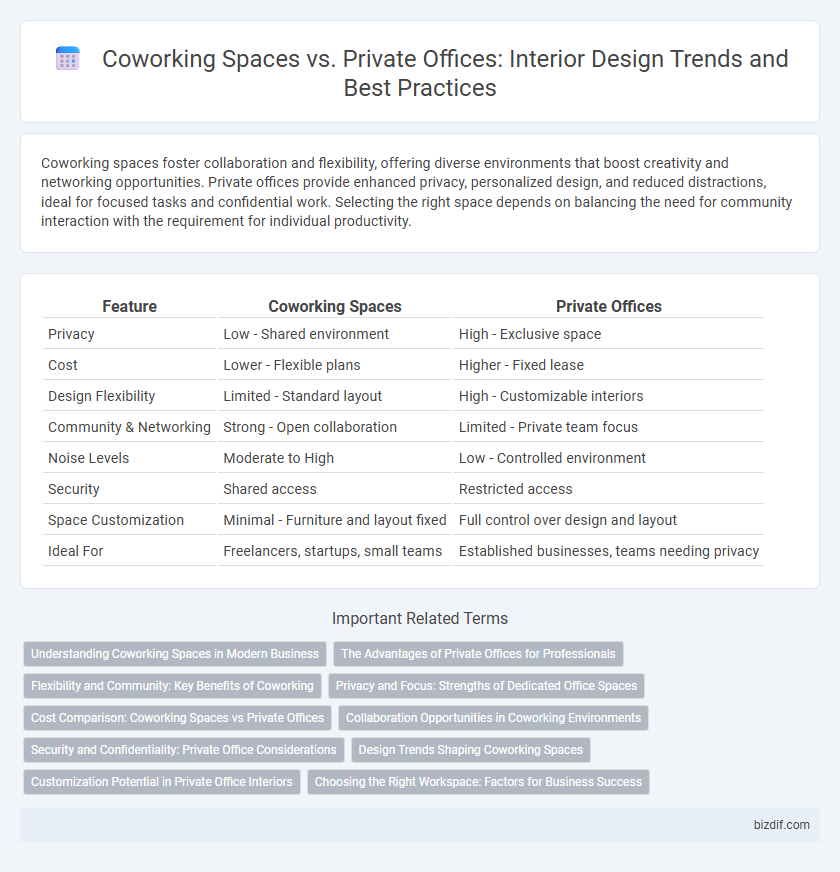Coworking spaces foster collaboration and flexibility, offering diverse environments that boost creativity and networking opportunities. Private offices provide enhanced privacy, personalized design, and reduced distractions, ideal for focused tasks and confidential work. Selecting the right space depends on balancing the need for community interaction with the requirement for individual productivity.
Table of Comparison
| Feature | Coworking Spaces | Private Offices |
|---|---|---|
| Privacy | Low - Shared environment | High - Exclusive space |
| Cost | Lower - Flexible plans | Higher - Fixed lease |
| Design Flexibility | Limited - Standard layout | High - Customizable interiors |
| Community & Networking | Strong - Open collaboration | Limited - Private team focus |
| Noise Levels | Moderate to High | Low - Controlled environment |
| Security | Shared access | Restricted access |
| Space Customization | Minimal - Furniture and layout fixed | Full control over design and layout |
| Ideal For | Freelancers, startups, small teams | Established businesses, teams needing privacy |
Understanding Coworking Spaces in Modern Business
Coworking spaces foster collaboration and creativity by offering flexible, shared work environments equipped with ergonomic furniture, high-speed internet, and communal areas, enhancing productivity for startups and freelancers. These spaces emphasize open layouts and natural lighting to promote a vibrant atmosphere, contrasting with private offices that provide enclosed, personalized workspaces prioritizing privacy and focus. Understanding the spatial and functional design differences helps businesses choose environments that align with their culture, team dynamics, and operational needs.
The Advantages of Private Offices for Professionals
Private offices provide professionals with enhanced privacy, reducing distractions and fostering focused work environments essential for productivity. Customizable interiors allow tailored organization, promoting efficient use of space and alignment with specific professional needs. Controlled access also ensures confidentiality for sensitive projects, offering security that coworking spaces may lack.
Flexibility and Community: Key Benefits of Coworking
Coworking spaces offer unparalleled flexibility by allowing professionals to choose various membership options tailored to their schedule and project needs, fostering a dynamic work environment. These spaces cultivate a strong sense of community through shared areas and networking events, encouraging collaboration and the exchange of ideas among diverse industries. Unlike private offices, coworking environments blend adaptability with social interaction, enhancing productivity and innovation in modern interior design.
Privacy and Focus: Strengths of Dedicated Office Spaces
Dedicated office spaces in interior design offer enhanced privacy and superior focus compared to coworking spaces, featuring soundproof walls, personalized layouts, and controlled environments that minimize distractions. These private offices allow for customized acoustics and ergonomic setups tailored to individual work styles, increasing productivity and concentration. Enhanced security and exclusive access further ensure confidential work and uninterrupted workflow, making dedicated offices ideal for businesses requiring discretion and deep focus.
Cost Comparison: Coworking Spaces vs Private Offices
Coworking spaces typically offer lower upfront costs and flexible monthly memberships, making them cost-effective for startups and freelancers. Private offices involve higher initial investments due to lease agreements and customization expenses but provide greater privacy and control. Evaluating total costs including utilities, maintenance, and amenities reveals coworking spaces often deliver better value for small teams.
Collaboration Opportunities in Coworking Environments
Coworking spaces foster collaboration by providing open layouts, shared resources, and communal areas that encourage spontaneous interactions and networking among diverse professionals. These environments are designed to inspire creativity through flexible seating arrangements, breakout zones, and collaborative tools that support group projects and idea exchange. In contrast, private offices prioritize individual focus and privacy, often limiting the organic collaborative opportunities that coworking spaces naturally promote.
Security and Confidentiality: Private Office Considerations
Private offices in coworking environments offer enhanced security and confidentiality through restricted access and dedicated entry points, ensuring sensitive information remains protected. Soundproof walls and lockable doors minimize the risk of eavesdropping and unauthorized visual access, crucial for businesses handling proprietary data. Specialized security systems, such as biometric scanners and surveillance cameras, further reinforce privacy and control over workspace access.
Design Trends Shaping Coworking Spaces
Coworking spaces increasingly embrace biophilic design, incorporating natural elements such as greenery and ample natural light to enhance productivity and well-being. Flexible layouts with modular furniture allow for adaptable work zones, catering to diverse work styles and fostering collaboration. Smart technology integration, including IoT-enabled lighting and climate controls, optimizes comfort and energy efficiency in modern coworking environments.
Customization Potential in Private Office Interiors
Private office interiors offer a high level of customization potential, allowing businesses to tailor layouts, furniture, and decor to reflect their brand identity and operational needs. Unlike coworking spaces, private offices enable personalized acoustic solutions, bespoke storage options, and adjustable lighting that enhance productivity and employee comfort. This degree of customization supports a unique, professional environment optimized for focused work and team collaboration.
Choosing the Right Workspace: Factors for Business Success
Coworking spaces offer flexibility, networking opportunities, and cost-efficiency ideal for startups and freelancers, while private offices provide privacy, customization, and dedicated branding for established businesses. Key factors influencing workspace choice include company size, budget constraints, operational needs, and desired level of collaboration or confidentiality. Selecting the appropriate environment aligns with business goals, enhances productivity, and supports long-term growth strategies.
Coworking spaces vs Private offices Infographic

 bizdif.com
bizdif.com